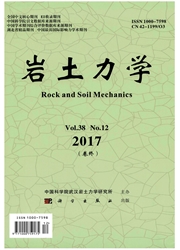

 中文摘要:
中文摘要:
提出了基于子集模拟的边坡风险评估的高效随机有限元法(RFEM),推导了基于子集模拟的边坡失效概率和失效风险的计算公式,并给出了基于高效RFEM的边坡可靠度分析和风险评估流程图。采用一个边坡算例验证了所提方法的有效性。结果表明,基于子集模拟的高效RFEM可以视为是对基于蒙特卡洛模拟的传统RFEM的改进,显著地提高了失效概率和失效风险的计算效率以及失效样本的产生能力,非常适用于分析小失效概率的可靠度问题,极大地增强了RFEM在边坡可靠度分析和风险评估中的实用性。高效RFEM将边坡的整体失效风险分解为对应不同概率水平的边坡失效风险,并量化了它们对整体风险的相对贡献度。在该方法中,边坡可靠度分析和风险评估与确定性边坡有限元分析互不耦合,极大地简化了它们的计算过程。此外,土体不排水抗剪强度的竖向空间变异性对边坡失效风险具有显著的影响。
 英文摘要:
英文摘要:
This paper develops an efficient random finite element method (RFEM) using subset simulation (SS) for slope risk assessment. Equations are derived for integrating SS with RFEM to evaluate slope failure probability and risk, and corresponding implementation procedures are illustrated. The proposed method is validated by using a soil slope example. The results indicate that the efficient RFEM based on SS can be viewed as a development of the original RFEM based on Monte Carlo simulation, and it significantly improves the computational efficiency of evaluating failure probability and risk as well as the ability to generate failure samples, particularly at small probability levels, which enhances the applications of RFEM to the slope reliability analysis and risk assessment. The proposed efficient RFEM expresses the overall slope failure risk as a weighted aggregation of slope failure risk at different probability levels and quantifies the relative contributions of those to the overall risk. In this method, slope reliability analysis and risk assessment are decoupled from the deterministic finite element analysis of slope stability, which highly simplifies the calculation procedures. In addition, it is found that the vertical spatial variability of the undrained shear strength affects the slope failure risk significantly.
 同期刊论文项目
同期刊论文项目
 同项目期刊论文
同项目期刊论文
 期刊信息
期刊信息
